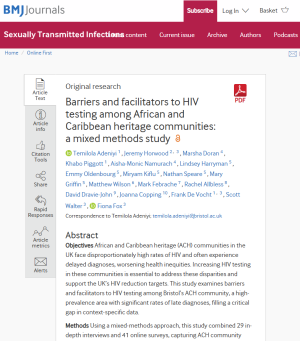Barbershops, trust and testing: Community-led HIV effort breaks down barriers in African and Caribbean communities
14 May 2025
A new study has revealed that HIV testing becomes far more trusted, accessible and routine when it is co-designed and delivered by the communities it aims to serve.
The research, led by NIHR ARC West and published in the journal Sexually Transmitted Infections, focuses on Common Ambition Bristol (CAB), a community-led initiative working to improve HIV awareness and testing for African and Caribbean heritage communities in Bristol.
Community researchers – members of the communities themselves – led the work on the ground. They helped design the study, interviewed participants, and build trust, making sure voices from the community were at the centre of the research.
The evaluation highlights how stigma, lack of knowledge, and unwelcoming services continue to be a barrier to HIV testing among African and Caribbean heritage communities in the UK. However, it also points to a powerful solution: community-led outreach.
Researchers found that personal fears – like concerns about privacy or being judged – combined with systemic barriers, such as a lack of culturally appropriate services, keep many people from seeking testing. Even as treatments and prevention tools like PrEP have advanced, awareness and trust lag behind.
The CAB initiative, which included outreach in barbershops and other familiar venues, helped challenge misconceptions, ease stigma, and create a space where people felt respected and heard.
The research team recommends making HIV testing more routine by placing services in trusted community spaces and improving the clarity of home testing kits.
Temilola Adeniyi, lead researcher from the University of Bristol and NIHR Doctoral Fellow, said:
“What really came through in this study is how powerful co-production work can be. Testing for HIV should feel normal – like looking after any other part of your health. When people feel seen, heard, and respected, they’re far more likely to take that step.
“I’m excited for the future as insights from our study may shape future services that truly reflect the needs of diverse communities.”
Principal Investigator Professor Jeremy Horwood added:
“The UK Government has set a goal of ending new HIV transmissions in England by 2030. This can only be achieved by address the inequalities faced by African and Caribbean heritage communities.
“Common Ambition Bristol is a powerful testament to the strength of community-led action in tackling health inequalities. By creating genuine partnerships and centring African and Caribbean heritage communities, we can break down stigma and improve access to testing.”
Common Ambition Bristol is a model for future public health efforts that aim to close health equity gaps through genuine community partnership.
Senior author, Dr Fiona Fox said:
“With significant advances in HIV prevention and treatment, it is imperative that no-one is left behind in efforts to eradicate transmission. People of African and Caribbean heritage are disproportionately affected by HIV. Efforts to understand the barriers they face to HIV testing, and identifying solutions are important to inform the development of targeted interventions.”
Paper
